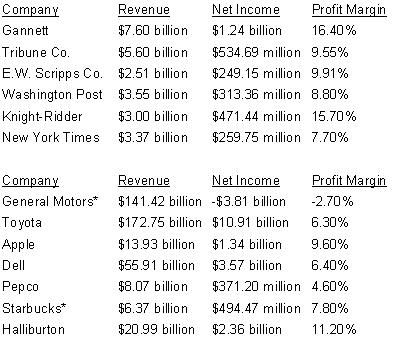While Kaiser argues, justifiably, that he prefers a newspaper to be privately held so as to be shielded from "Wall Street pressures", he says that most newspapers are nonetheless beating the 5-10% profit margin that traditional manufacturing industries like.
Is he right? I decided to look up how some leading newspaper publishers did in 2005, and for fun, compare that to the performance of some top companies in other industries. Check it out:
(Profit margin = net income / revenue)
All data via 2005 income statements from Yahoo! Finance.

* - General Motors has not released fourth quarter results from 2005, so data is through three quarters. Starbucks fiscal year is Oct. '04 - Sept. '05.
So while Kaiser was exaggerating a bit, it does appear that newspapers are holding their own. The six publishers above are, in order, the largest newspaper publishers by market cap, and each of them are turning decent profit margins. (Though Knight-Ridder was just bought by McClatchy, who intends to sell a number of the KR papers.) Tribune stacks up favorably against Dell, a company with revenues in the same ballpark. Gannett can arguably be compared to Apple.
In this light, reports of the demise of the "ink and dead tree" business appear to be unfounded. What remains to be seen is how newspapers adapt to deal with competition from other mediums that are stealing advertising and providing alternative content.
2 comments:
Well...hasn't "how newspapers adapt to deal with competition from other mediums..." been the issue all along? Nonetheless, nice research.
Yes, that has been the question, but I think it has been asked for the wrong reason. In light of reduced subscription #s and alternative mediums, papers have been trimming costs, closing bureaus, reducing positions, etc. But if they are still turning healthy profit margins, perhaps this is the wrong course of action. After all, the big newspapers' ability to command so many resources is their primary advantage. I hope they utilize that strength.
Post a Comment